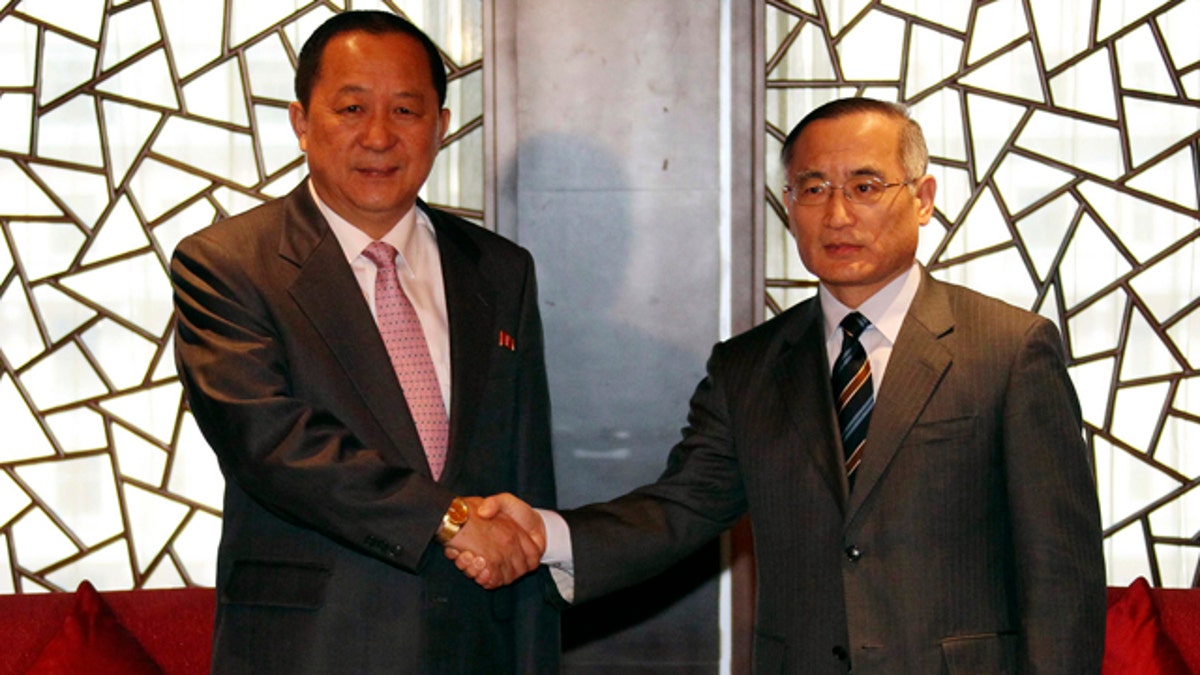
Sept. 21: South Korean nuclear envoy Wi Sung-lac, right, shakes hands with his North Korea's counterpart Ri Yong Ho at the private Chang An Club in Beijing, China. (AP)
BEIJING – Representatives of North and South Korea met Wednesday, but showed no sign of bridging their differences to resume negotiations on ending Pyongyang's nuclear program after it walked out two years ago.
Seoul's main nuclear negotiator Wi Sung-lac and his counterpart Ri Yong Ho both described their rare meeting as constructive after emerging from the private Chang An Club in central Beijing.
But although Wi said the contacts would continue, neither side gave any details and Ri appeared to say North Korea would not make any concessions to get the talks going again.
North Korea wants the talks to resume immediately without any preconditions. However, South Korea wants North Korea to first demonstrate it is sincere about disarmament and take responsibility for two deadly attacks on its territory last year.
U.S. National Security Council director for Asia, Daniel Russel, said the fact that South and North Korea were talking was a good thing, but it was "a bit rich" for the North to call for a resumption of the six-party talks it had walked out of in 2009.
He told a news conference in New York that the U.S., Japan and South Korea were looking for a "seriousness of purpose" by North Korea to show it would implement commitments on denuclearization it had agreed to in 2005.
Before Wednesday's talks started, South Korean officials had said they wanted them to focus on what kind of preliminary measures the North must take before the six-party talks can resume.
The meetings were the latest in a series of small steps taken in recent months -- Wi and Ri met two months ago in Bali, Indonesia, -- to revive the on-again, off-again six-nation disarmament talks, which include China, the United States, Japan and Russia, besides the two Koreas.
Through this meeting "we ... put forward efforts to return to the six-party talks without preconditions," Ri told reporters, repeating his country's stand.
Wi expressed the hope that his three-hours talks with Ri would "create conditions for the resumption of the six-party talks. We would like to have more of such discussions."
Despite the lack of apparent breakthrough, South Korean analyst Yang Moo-jin said the talks did leave open the possibility of future progress. Yang, a professor at the University of North Korean Studies in Seoul, said the talks meant the two Koreas would keep trying to ease tensions on the peninsula.
China is the host for the talks and has been trying to put them back on track. Separately, the Chinese Foreign Ministry announced Wednesday that North Korean Premier Choe Yong Rim will visit Beijing next week.
Wi will also meet with Chinese nuclear envoy, Wu Dawei, on Thursday, said a South Korean Foreign Ministry official who spoke on condition of anonymity in keeping with government rules.
North Korea walked out of the sputtering nuclear negotiations after the United Nations condemned it for launching a long-range rocket in April 2009. The North claimed it had only launched a satellite, but didn't convince many. Pyongyang then demonstrated its anger by exploding a nuclear device in May.
The nuclear test bolstered critics in South Korea who said their government shouldn't give North Korea a long leash when its strategy seems to be to raise tensions to gain more aid and other concessions to shore up a tricky political succession at home.
But in recent months, North Korea -- facing food shortages and a listless economy -- has repeatedly expressed its willingness to rejoin the talks.
With elections coming up in South Korea, where relations with the North are an emotional issue, President Lee Myung-bak has also indicated a softening of his less compromising policy.
South Korea and U.S. officials have demanded the North halt its uranium-enrichment program, freeze nuclear and missile tests and allow international nuclear inspectors back into the country.
Last year, North Korea shelled a South Korean front-line island, killing four people, and allegedly torpedoed a South Korean warship, killing 46.
During a visit to Russia last month, North Korean leader Kim Jong Il reportedly suggested the North could be open to halting nuclear production and testing if the six-party talks resume.
